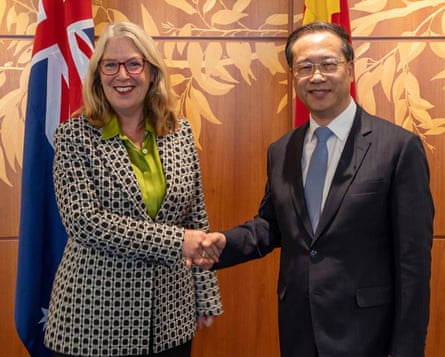Australian wine producers hope Beijing could soon remove tariffs that slashed the $1.2bn trade by 99% – but say they are wary about relying too heavily on the Chinese market.
After the Australian government announced a deal with China that could lead to the scrapping of tariffs on barley within months, wine producers also expressed cautious optimism.
The chief executive of Australian Grape and Wine, Lee McLean, said he hoped China’s promised review of the barley tariffs went well and could serve as a template for removing the imposts on Australian wine.
McLean said it had been a “very, very difficult” time for Australian grape and wine producers after tariffs of up to 212%, introduced in late 2020, wiped out the trade to China.
He said annual wine exports from Australia to China peaked at $1.2bn before the imposts, but the value had fallen to just $12m last year.
Like barley, the wine tariffs are the subject of an Australian government challenge before the World Trade Organization that is due to be decided this year. McLean said he was “reasonably pragmatic” about how the dispute could ultimately be resolved, including the option of a deal prior to the WTO ruling.
But McLean said even if the tariffs were removed, he did not believe Australian wine exports to China would return to the $1.2bn peak “in the short to medium term at least”.
“I think everyone is firmly of the view that, whether China opens up or not, we need to continue that market diversification effort and try to grow opportunities in markets across the world,” he said.
McLean said the Chinese market had “probably changed in the couple of years that we’ve been absent”. Chilean producers had taken some of the market share that had been filled by Australia and other changes in the Chinese economy may affect demand.
He said Australian wine producers continued to see China as “a really significant market for us”. But even if China returned to being the biggest export destination for Australian wine, many producers would seek to “balance” their exposure to the country with renewed focus on expanding to other markets.

Trade was one of the key topics on the agenda when the secretary of the Department of Foreign Affairs and Trade, Jan Adams, held talks with a visiting senior Chinese official in Canberra on Wednesday.
In the meeting with China’s executive vice minister of foreign affairs, Ma Zhaoxu, Adams argued it was “in the shared interests of Australia and China to continue on the path of stabilising the bilateral relationship”.
The talks “covered a range of bilateral and international topics, including trade, consular, human rights, strategic competition, and Russia’s invasion of Ukraine”, according to a statement issued by Dfat. It said Australia and China last held bilateral talks at the secretary-level in Beijing in February 2019.
Under the deal announced a day earlier, Australia temporarily suspended its WTO challenge against the barley tariffs in return for China agreeing to “undertake an expedited review” of those imposts over the next three to four months.
If China does not end up scrapping the barley tariffs, Australia plans to resume that dispute process at the point at which it was paused.
after newsletter promotion
China’s commerce ministry said Beijing was ready to work with Australia to “properly resolve economic and trade disputes, including the two cases still at the WTO panel stage”. That framing appears to include both barley and wine.
The chief executive of the National Farmers’ Federation, Tony Mahar, said he hoped to see progress on removing blockages on wine and rock lobster exports.
Mahar said it was “important to explore new opportunities” and the recent progress on free trade agreements with the UK, the EU and India were good examples of that work.
“However, revitalising our relationship with a key market like China is also in the best interests of our farmers who export more than 70% of what they produce,” he said.
The trade minister, Don Farrell, briefed his state and territory counterparts on the progress in stabilising the relationship with China during a meeting in Townsville on Wednesday.
But the ministers said in a joint statement that they also “recognised the importance of continuing efforts to diversify trade and investment opportunities to deliver a more productive and secure economy”.
The foreign affairs minister, Penny Wong, said Australia wanted a more stable relationship with China, but would no longer be able to separate economic and strategic considerations.
“The point is that we’re not going back to where we were 15 years ago,” Wong told Nine’s Today program.
“It means Australian producers, whether of barley or wine, are going to have to look to diversify markets, and that’s one of the things the government is working on with industry, is to continue to diversify markets.”
Wong confirmed that if the barley tariff review was successful, the government would seek a similar resolution of the wine dispute.
The Chinese foreign ministry said the country would work constructively with Australia to “resolve our respective concerns on trade and economic issues in a balanced way”.


